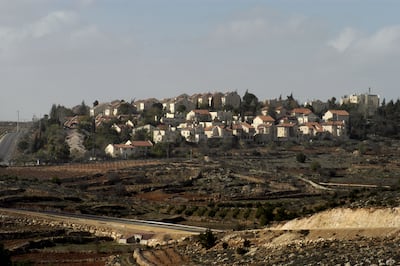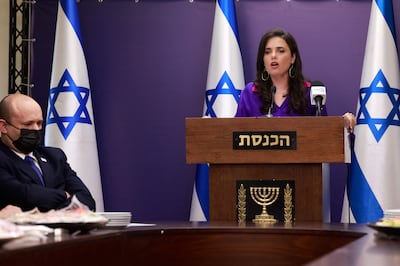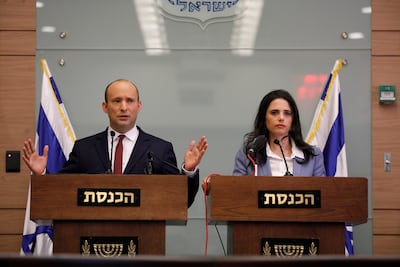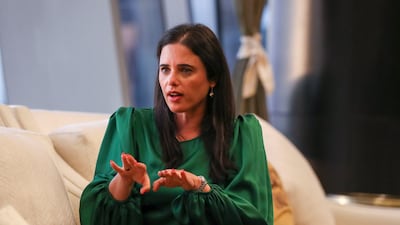The Israeli government will not discuss the establishment of a Palestinian state under current Prime Minister Naftali Bennett or Yair Lapid when he takes over as part of a rotation arrangement, Israeli Interior Minister Ayelet Shaked has said.
In an exclusive interview with The National, Ms Shaked said there was a consensus among the right-wing, leftist and centrist parties sitting together in one governing coalition not to address any issue that might cause an internal rift – including resolving the Palestinian-Israeli conflict.
“The current situation is the best for everyone,” Ms Shaked said during her visit to Abu Dhabi on Monday.
Ms Shaked, who is one of Israel's most influential politicians and a linchpin in the current government, wants to manage the conflict with the Palestinians, not resolve it.
“It’s better to keep it that way,” said Ms Shaked, 45, who served as justice minister between 2015 and 2019.
“We do believe in economic peace to improve Palestinian lives and to do mutual industrial zones. But not a state with an army, definitely.”
The diverse government, which for the first time includes an Arab party, was formed in June after political parties agreed a coalition that ended Benjamin Netanyahu’s 12-year tenure as prime minister.
The parties had little in common other than a desire to unseat Mr Netanyahu. Under the coalition deal, Mr Bennett serves as prime minister for two years, after which he is to be replaced by Mr Lapid.
Ms Shaked is a key ally of Mr Bennett, who leads the ultranationalist Yamina (Rightwards) party that champions Jewish settlement in the Israeli-occupied West Bank.

Ms Shaked refuses to call the settlements illegal, instead calling them “territory under dispute”. She described the campaigners behind the Boycotts Divestments Sanctions against Israel as “hypocrites”.
“They are anti-Semitic as they are against the existence of Israel. BDS is a new form of anti-Semitism,” she said.
Her right-wing Yamina alliance believes the Jewish people have a legal, historic and moral claim to the West Bank.
The movement calls on Israel to withdraw from the territories it has occupied since the 1967 war, to dismantle the wall that separates pre-1967 Israel from parts of the occupied West Bank and to permit Palestinian refugees to return to their homes.
No two-state solution
Ms Shaked was open about her fierce opposition to the concept of a two-state solution to the Palestinian-Israeli conflict. She said Israel had learnt invaluable lessons from its past conflicts.
“We have known first-hand that from every territory we withdraw, a terror organisation will spring up. It happened in South Lebanon where Hezbollah is ruling and funded by Iran and having thousands of missiles pinpointed at Israel,” she said.
“When we withdrew from Gaza, people were saying it would be another Monaco – but we know what happened there, Hamas took over the city turned it into a terror state. We will not repeat this experiment again.”
Israeli Health Minister Nitzan Horowitz on Sunday became the second top Israeli official to meet Palestinian leader Mahmoud Abbas since the new government took office.
Defence Minister Benny Gantz also met Mr Abbas at his West Bank headquarters in August, in the first high-level face-to-face talks in over a decade.
But for Ms Shaked, the Palestinian leader is not a partner for a genuine peace deal.
“Mahmoud Abbas hasn’t held elections because he’s afraid to lose to Hamas. If there’s an election … Hamas will take over,” Ms Shaked said.

Ms Shaked described her country’s deals with the UAE, Bahrain, Morocco and Sudan to normalise relations as a “role model” for others, and said she expected more Arab and Muslim countries to follow suit.
“Everyone has seen the benefits of the peace [between the UAE and Israel]; mainly at the economic, tourism and technology levels,” she said.
Surge in gang violence
Ms Shaked, a daughter of an Iraqi father born in Iran, said she was alarmed by the sharp rise in the violence within Israeli Arab communities in the country.
Israeli official data shows that many of the record number of murders are concentrated in cities with large Arab populations.
“This is one of the topics I have discussed during my visit here in Abu Dhabi. There was a Cabinet meeting before my visit and we have decided to give this issue first and foremost priority and the resources needed to curb the surge in crime in Israeli cities that have large Arab populations,” Ms Shaked said.
“Abu Dhabi is one of the safest cities in the world, and I’m sure we can learn from one another.”
Ms Shaked said easily available weapons were a key factor in the rising violence in which 96 Israeli Arabs have died since the beginning of 2021.
She said some 400,000 illegal weapons were believed to be in the hands of Israeli Arab gangs.
“There’s a serious problem of criminalisation in the Israeli cities with large Arab populations. It’s an Israeli Arabs against Israeli Arabs phenomenon. There are gangs, drug dealers and illegal weapons including those purchased as toys from online stores like Amazon and then improvised into real weapons. Gangs are also stealing weapons from the military,” she said.
In the last Cabinet meeting on Sunday, the Israeli government decided to seek the help of the domestic intelligence service Shin Bet to fight the crime surge.
Ms Shaked conceded that more needed to be done.
“We are putting a lot of effort in the army, investing in the Mossad and we have great resources for enemies outside our borders, but apparently we have not made our best in order to strengthen our police to fight these gangs,” she said.
Ms Shaked said the surge in murders in Israeli Arab communities was largely the result of criminal gangs capitalising on reduced law enforcement budgets. She said that the Cabinet had decided to allocate NIS 2.5 billion ($770 million) to fighting crime.

The surge in violence has sparked a social media campaign in recent weeks, with the hashtag #Arab_lives_matter trending on Twitter as activists accused the government of neglecting and disregarding Israel's Arab communities for decades.
Israeli Arabs make up about 20 per cent of the country's population of 9 million.
Ms Shaked rejected the accusation that Arabs in Israel have become second-class citizens.
The former justice minister courted controversy in 2019 when she released a provocative campaign video before the elections, in which she appeared in a mock advertisement for a perfume called “Fascism".
“To me, it smells like democracy,” she says in the video.
She laughed heartily when asked how a right-wing Israeli minister could cover herself in fascism.
“That was a joke – a complete joke,” she said. “There was a debate about restructuring the judiciary and some people accused me of supporting fascism.”












